Tax Revenue To Drop $180 Million, Double ’09 Recession; Joblon Fears Cherry Creek’s BMC Eatery Ventures May Not Survive
by Glen Richardson
Construction that’s been a-boomin’ in Denver-Cherry Creek since 2013, fueled by a strong job market and a booming tech industry, is about to go bust. That’s the conclusion of an online panel discussion dissecting the coronavirus pandemic’s impact on the metro economy.
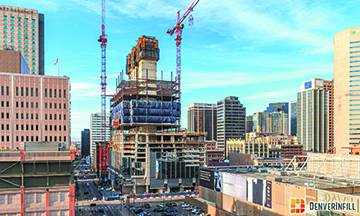
Hosted by BusinessDen — the Mile High City’s online homepage — a foursome of developers speaking at Assembly III made it clear that we’ve just seen a very abrupt end to the boom cycle.
Furthermore, the panel isn’t expecting a quick turnaround of the boom that stretched the boundaries of downtown and put a record number of cranes in the air. BMC Investments’ Matt Joblon, who has invested heavily in Cherry Creek, was blunt about what’s ahead: “I think we’re going pretty deep into a recession and I think it’s going to be drawn out, unfortunately,” Joblon cautioned. His reasoning: “You can’t put a global economy into a coma for two months and just turn it back on and expect things to go back to normal,” he asserted. “If you’re expecting that, you’re going to get punched in the face, really hard.”
Projects currently being built will obviously get finished, according to the panel, but after that it’s from full throttle to sudden stop. “When I can go out and buy a distressed asset at half the price I can build it new, it doesn’t take a genius to figure out what’s going to happen,” Rhys Duggan, president-CEO of Revesco Properties, explicitly explained.
City Crunch
The nationwide financial crisis created by the pandemic and policymakers is doubly grim for Denver. In terms of vulnerability, the City is ranked the nation’s third worst, just behind Detroit. Denver is one of the cities that relies heavily on sales taxes, meaning the closure of restaurants and retail outlets will create an immediate reduction in city revenue. The city’s financial staff expects city tax collections to shrink by an estimated $180 million. The shortfall equates to a 12% drop in tax revenue — roughly double the hit caused by the 2009 recession.
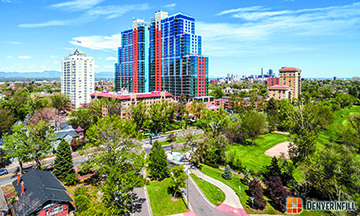
The fact is Denver’s stay-at-home mandate has cramped consumer spending, crippled restaurants and shops, canceled the city’s tourism industry, and essentially vacated DIA. As a result, tax collections from local and online retail stores, restaurants, bars, marijuana dispensaries, hotel stays, car rentals and jet fuel taxes are quickly drying up.
Another big worry is the city’s massive buildup of new apartments. Denver has been among the top three apartment builders in the country, adding more than 15,000 new units per year. History has shown that recessions hit apartments hard. People stop filling units immediately. Vacancy spikes and rent falls. This could be a disaster scenario for Denver since developers were continuing to add tens of thousands of units as 2020 was getting underway.
A New Ballgame
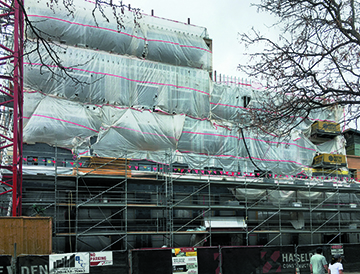
A survey conducted by the Colorado Restaurant Assn. indicated that if eateries weren’t able to open until mid-May, 11% would close permanently. If not opened until the end of May, upwards of 20% might close permanently. Joblon is even less optimistic, predicting that 30% of restaurateurs and retailers will not open again. “That’s going to create massive retail vacancy and unemployment right there,” he told the panel. Joblon adds that as things start to open again, Cherry Creek’s high-end restaurants — including those BMC has invested in — might not be able to survive.
The Valley’s hotel industry is expected to fare even worse. Currently building a new hotel in RiNo that’s scheduled for opening next spring, panel member Andrew Feinstein — managing partner of Exdo Properties — had this to say about the hotel outlook: “The good news is we are on time, and the bad news is that we are on time,” he declared. “It’s going to be a whole new ballgame delivering a hotel with a restaurant and bar in May 2021, but I’m glad it’s May of 2021 and not May of 2020.”
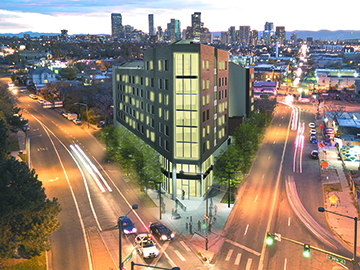
Joblon’s BMC Investments is currently building a hotel and social club on Clayton St. in Cherry Creek, but isn’t expecting additional hotels or other new projects to be built in the district. Thus plans for a hotel at the shuttered Bombay Clay Oven site on Cherry Creek’s Steele St. is unlikely. A pair of developers paid $2 million for the site but a San Francisco firm set to lease the project pulled construction plans when the pandemic hit.
Also in question is the redevelopment of the east side of Clayton St. across from Joblon’s hotel. Broe Real Estate planned to begin a makeover of the eastside of the street this spring. Transformation plans included demolishing two existing structures and replacing them with an eight-story building. Another seven-story building was to be built at an existing parking garage site.
Hotels Hemorrhaging
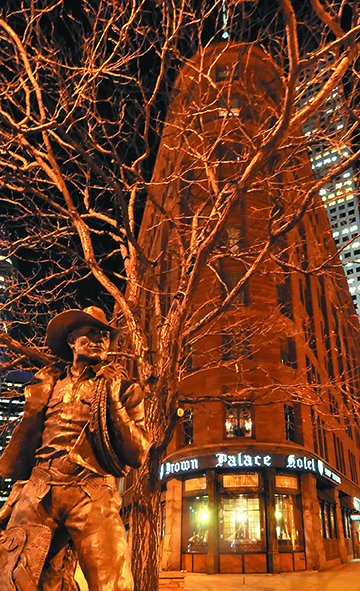
Denver’s hotel and hospitality sector has been among the Valley’s hardest hit by the pandemics. Owners and investors are reeling, as occupancy dropped to zero and most shut down. Closures included the legendary-ritzy Brown Palace that opened in 1892, and hadn’t closed until now. The city-state’s largest hotel, the Gaylord Rockies Resort also closed, its $80 million, 317-room expansion postponed to stave off money losses. Downtown’s Four Seasons and Grand Hyatt also closed as did the JW Marriott and Halcyon in Cherry Creek. Occupancy isn’t likely to come back until at least the fourth quarter of 2020.
The metro Denver market contains 44,437 rooms across 318 hotels. Another 1,263 keys were delivered during the last 12 months, the largest increase in hotel rooms in Denver’s history. Hoteliers must now grapple with finding a GPS to get them back on the road safely as they begin to accelerate. Unlike in previous years, high speeds could spell disaster unless they make smooth, sensible decisions.
The road ahead will also be challenging for city-state car dealers as Colorado’s first quarter car registrations through March 2020 declined 22.1%. Moreover, Colorado Automobile Dealers Assn. President Tim Jackson is predicting up to a 60% decline, or more, over the next couple of quarters as the impact of the virus impacts travel and the economy.
